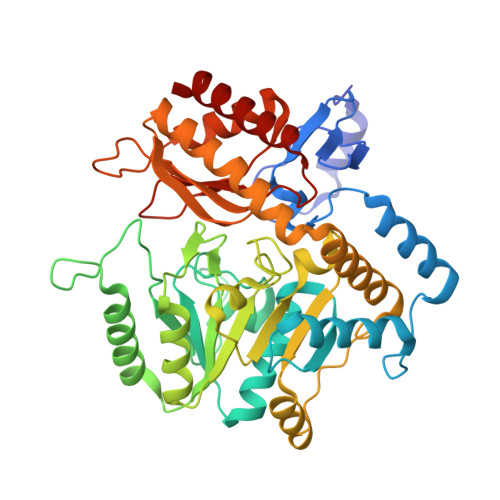Aminophosphonate Inhibitors of Dialkylglycine Decarboxylase: Structural Basis for Slow Binding Inhibition
Liu, W., Rogers, C.J., Fisher, A.J., Toney, M.D.(2002) Biochemistry 41: 12320-12328
- PubMed: 12369820
- DOI: https://doi.org/10.1021/bi026318g
- Primary Citation of Related Structures:
1M0N, 1M0O, 1M0P, 1M0Q - PubMed Abstract:
The kinetics of inhibition of dialkylglycine decarboxylase by five aminophosphonate inhibitors are presented. Two of these [(R)-1-amino-1-methylpropanephosphonate and (S)-1-aminoethanephosphonate] are slow binding inhibitors. The inhibitors follow a mechanism in which a weak complex is rapidly formed, followed by slow isomerization to the tight complex. Here, the tight complexes are bound 10-fold more tightly than the weak, initial complexes. The slow onset inhibition occurs with t(1/2) values of 1.3 and 0.55 min at saturating inhibitor concentrations for the AMPP and S-AEP inhibitors, respectively, while dissociation of these inhibitor complexes occurs with t(1/2) values of 13 and 4.6 min, respectively. The X-ray structures of four of the inhibitors in complex with dialkylglycine decarboxylase have been determined to resolutions ranging from 2.6 to 2.0 A, and refined to R-factors of 14.5-19.5%. These structures show variation in the active site structure with inhibitor side chain size and slow binding character. It is proposed that the slow binding behavior originates in an isomerization from an initial complex in which the PLP pyridine nitrogen-D243 OD2 distance is approximately 2.9 A to one in which it is approximately 2.7 A. The angles that the C-P bonds make with the p orbitals of the aldimine pi system are correlated with the reactivities of the analogous amino acid substrates, suggesting a role for stereoelectronic effects in Schiff base reactivity.
- Department of Chemistry, University of California, Davis, California 95616, USA.
Organizational Affiliation:



















